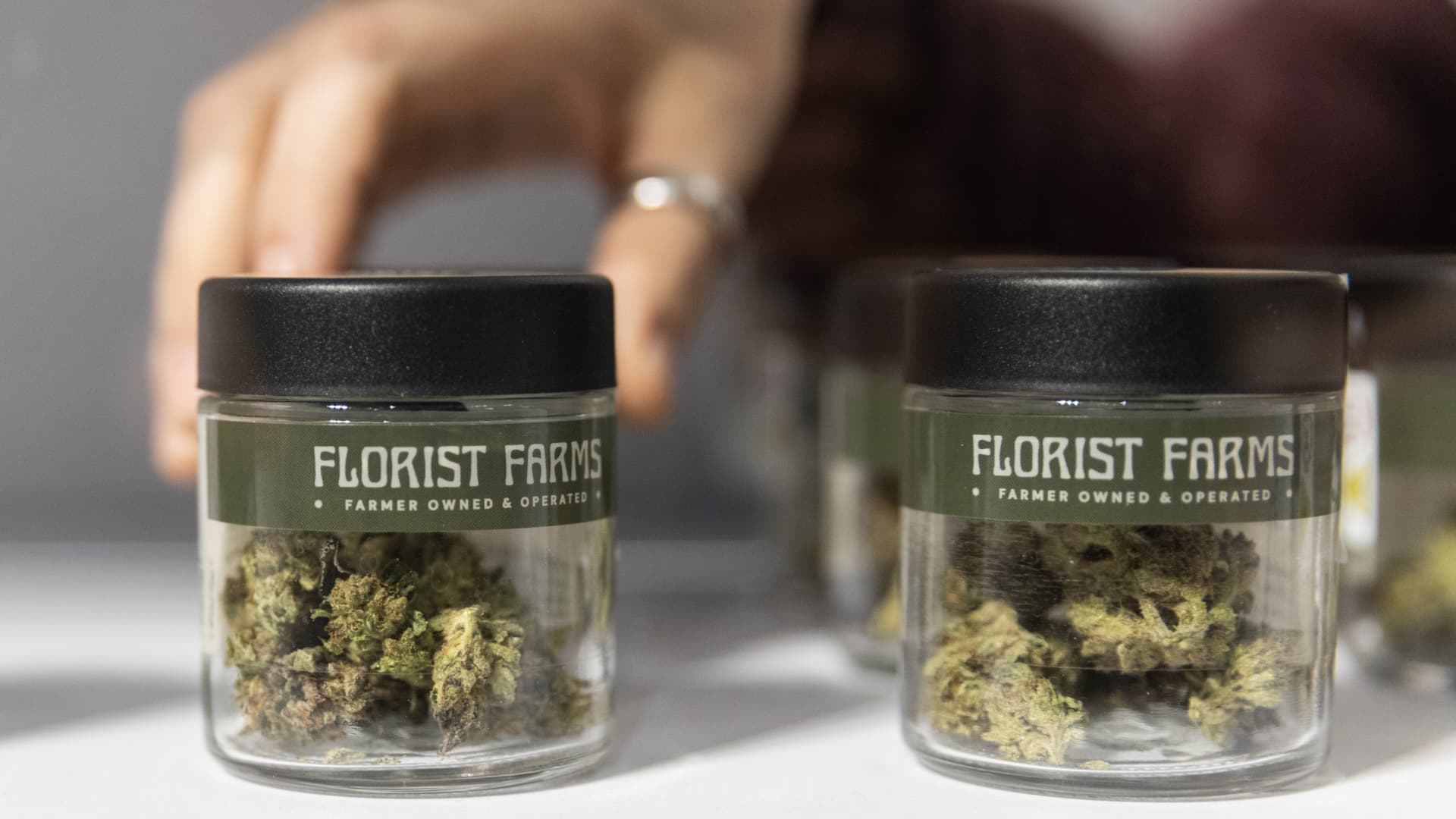
A worker sets up Florist Farms cannabis products on the first day of legal recreational marijuana sales at the Housing Works Cannabis Co. in New York, on Thursday, Dec. 29, 2022.
Jeenah Moon | Bloomberg | Getty Images
This week, the Health and Human Services Department asked the Drug Enforcement Agency to consider easing restrictions on marijuana upon a review of its classification under the Controlled Substances Act.
It could be a significant catalyst for an industry hemmed in by federal regulations even as legalization picks up on the state level.
Marijuana stocks were higher Wednesday on the news. Aurora Cannabis, Canopy Growth and Tilray Brands were among those to see jumps. They all jumped again Thursday.
Since the 1970s, marijuana has been listed alongside heroin and LSD as Schedule I drugs, or substances that authorities say have no accepted medical use and a high potential for abuse. Today, marijuana has remained in this category – ranking higher than fentanyl, cocaine and methamphetamine – despite there being favorable momentum for pot in scientific research and state laws.
The DEA will consider moving marijuana down to a Schedule III drug, alongside ketamine, anabolic steroids and testosterone as a substance that has moderate to low potential for physical or psychological dependence. The recommendation, however, will not de-schedule marijuana.
Cultivation, production and sales would still be in violation of federal law. Marijuana is legal in 39 states medically and 23 states recreationally.
What’s next for marijuana policy?
As part of the recommendation process, HHS conducted a scientific and medical evaluation that will help authorities come to a final decision on the matter.
A decision is likely to come before the 2024 presidential election, Roth MKM analyst Scott Fortune wrote in a Thursday note to clients.
“Historically, the DEA has never gone against a scheduling recommendation from the HHS,” Fortune added.
The DEA will consider marijuana’s reclassification under three criteria: Its potential for abuse, its potential for medical use, and the extent to which its unsafe or addictive.
Regulators have previously used the second criterion to uphold marijuana’s Schedule I classification, but doing so now may prove difficult, said Fortune, with medical marijuana programs existing in nearly 40 states across the nation.
Once the DEA comes to it decision, it will submit its own recommendation in the form of a proposal to the attorney general, who will then make his final ruling.
What does it mean for the weed industry?
If marijuana moves down to a Schedule III substance, this will effectively ease a number of restrictions holding the sector back.
The biggest boon will come in the form of new tax opportunities. Currently, enterprises dealing in Schedule I substances aren’t allowed to write expenses off their federal tax returns under an Internal Revenue Service code known as 280E.
This has been a hindrance for many cultivators, processors and retailers struggling to remain profitable as the industry sees a slowdown in sales.
“The removal of 280E will have a widespread material impact on the financial performance of every company in the industry, large and small, public and private,” said Jeff Schultz, a marijuana attorney at Foley Hoag.

What’s more, the potential rescheduling will allow for interstate commerce. While many states have legal markets within their borders, transporting Schedule I substances across state lines in illegal, resulting in a glut of marijuana in some states.
The move will furthermore expand potential for research in the sector, entice investors back amid a capital crunch, and possibly return value to publicly traded marijuana stocks.
The rescheduling, however, will not free up banking services for the industry, which has been kept out of traditional banking and loans due to marijuana’s federal standing. Schedule III drugs still present a risk for banking institutions so long as federal laws remain unchanged.
A bill called the Secure and Fair Enforcement Banking Act, or SAFE, will remove this burden and is making its way through Congress.
Is federal pot legalization on the horizon?
Senate Majority Leader Chuck Schumer, D-New York, said while this is an important step forward for the industry, the end goal is ending federal prohibition.
“HHS has done the right thing and DEA should now quickly follow through on this important step to greatly reduce the harm caused by draconian marijuana laws,” Schumer said in a statement Thursday. “There is still much more that needs to be done legislatively to end the federal prohibition on cannabis and roll back the War on Drugs.”
Industry executives echoed Schumer’s feelings.
“Federal cannabis reform is long overdue, and today’s news brings us closer to the Biden administration declaring an end to the U.S. government’s failed war on cannabis,” said David Goubert, CEO of multi-state dispensary operator Ayr Wellness.







